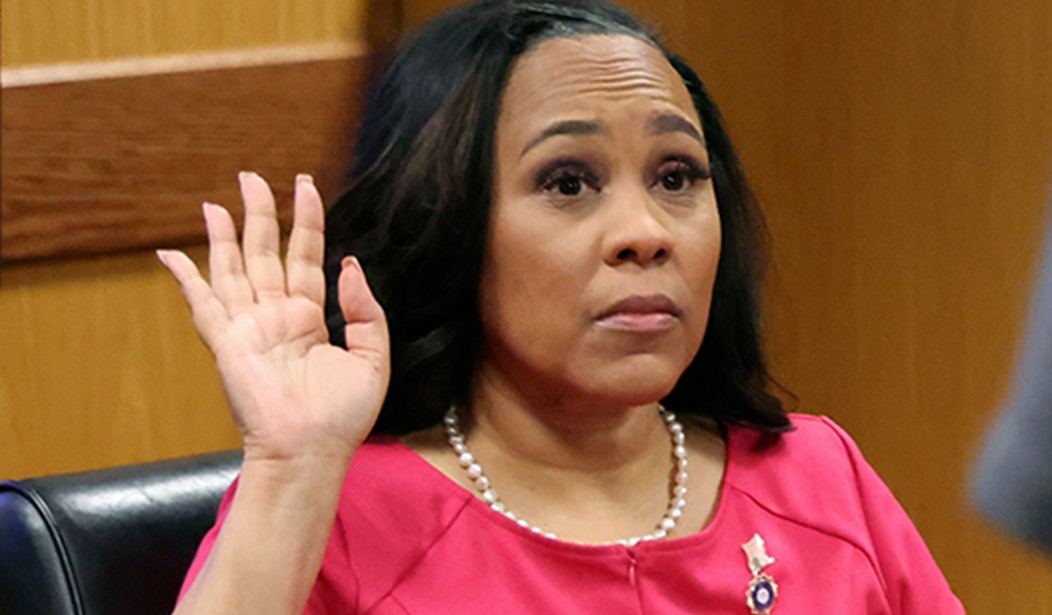The Georgia Court of Appeals has set a date to hear former President Donald Trump's bid to kick Fulton County District Attorney Fani Willis off the crumbling Georgia election interference case.
With the proceedings indefinitely postponed, the state's appellate court on Tuesday scheduled oral arguments for the morning of December 5, a month after the presidential race, thereby officially foiling the Democrat DA's plot to take Trump to trial before Election Day.
🚨 BREAKING: Trump's oral arguments to disqualify Fulton County DA Fani Willis in the crumbling Georgia election interference case will be heard by the state's Court of Appeals on Dec. 5, meaning the proceedings are definitively delayed until after the presidential election. pic.twitter.com/7QUIEfDWSm
— Mia Cathell (@MiaCathell) July 16, 2024
Trump's defense counsel will argue for Willis's removal on appeal before a three-judge panel. According to the court order, those judges, randomly selected by computer, are all GOP-appointed. They are Trenton Brown, who was appointed by former Georgia GOP Gov. Nathan Deal; Todd Markle, another Deal appointee; and Benjamin Land, who was appointed by current Republican Gov. Brian Kemp. The trio will likely be deliberating Willis's fate in the new year, barring any changes to the court calendar.
Originally, the Georgia appeals court eyed early October for a pre-election hearing date, but that was nixed due to a scheduling conflict. Willis was racing to obtain a verdict prior to the presidential election, trying to try Trump as early as August.
Recommended
The state's constitution stipulates that the judges must come to a conclusion within two terms of court, which would mean a ruling sometime before mid-March 2025.
Georgia State University constitutional law professor Anthony Michael Kreis remarked on X's platform that if Trump wins in November, he'll have to be severed from his remaining co-defendants, whom he was charged alongside in an August 2023 grand jury indictment. Meanwhile, others suspect that in the event that Trump beats Biden, the proceedings against the president will be put on pause until Trump's presidential term is over, if not tossed out entirely.
Tuesday's court order arrived a day after the dismissal of Trump's classified documents case in Florida. Federal Judge Aileen Cannon decided to dismiss the indictment against Trump on grounds that Special Counsel Jack Smith's appointment was unconstitutional and "effectively usurps" legislative power.
According to the 93-page court order dismissing Trump's classified documents case, Special Counsel Jack Smith's "unlawful" appointment "usurps" legislative authority. pic.twitter.com/we2ehhXA3j
— Mia Cathell (@MiaCathell) July 15, 2024
Fulton County Judge Scott McAfee, who oversaw Willis's prosecutorial misconduct proceedings, delivered the non-disqualification decision in March, allowing her to stay on one condition: her ex-lover Nathan Wade, whom she had hired to helm the prosecution of Trump, steps aside or she withdraws herself.
Within hours of the ultimatum's issuance, Wade resigned for the sake of the case's continuance, but that didn't satisfy the Trump co-defendants, who contended that the case was still compromised with Willis in charge.
McAfee found that Trump's team had cited "legally insufficient" evidence for him to conclude that "an actual conflict of interest," which would have warranted Willis's ousting, arose from the chief prosecutor's undisclosed affair with Wade, who had taken her on trips around the world and paid for the spending spree with portions of his taxpayer-funded paychecks. However, he did acknowledge that "an appearance of impropriety" infected the prosecution.
Even if the sexploits started after Wade's appointment in November 2021, McAfee noted, Willis "chose to continue supervising and paying Wade while maintaining such a relationship. She further allowed the regular and loose exchange of money between them without any exact or verifiable measure of reconciliation. This lack of a confirmed financial split creates the possibility and appearance that the District Attorney benefited [...] from a contract whose award lay solely within her purview and policing."
Nevertheless, McAfee felt that disqualifying Willis was not "necessary" when "a less drastic and sufficiently remedial option is available," that is voluntary recusal.
"This finding is by no means an indication that the Court condones this tremendous lapse in judgment or the unprofessional manner of the District Attorney's testimony during the evidentiary hearing," McAfee wrote. "Rather, it is the undersigned's opinion that Georgia law does not permit the finding of an actual conflict for simply making bad choices—even repeatedly..."
The defense appealed, and the appeals court agreed to take up the matter. Then they stayed all lower-court proceedings pending the panel's opinion, thus throwing Trump's case into a state of limbo. McAfee previously indicated that he would not pause anything while Trump's team litigates the appeal, meaning McAfee intended to address pre-trial matters, such as outstanding motions, in the meantime to keep the derailed Trump case on track.
Now, the appeals panel will not be collecting new evidence. Instead, it will determine whether McAfee correctly ruled on the defense's motion to disqualify Willis. Two votes will be needed to reverse the trial court's ruling.

























Join the conversation as a VIP Member